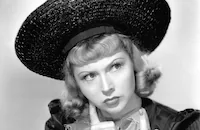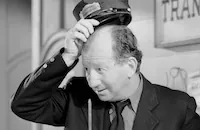Annabelle's Affairs
Brief Synopsis
Cast & Crew
Alfred Werker
Victor Mclaglen
Jeanette Macdonald
Roland Young
Sam Hardy
William Collier Sr.
Film Details
Technical Specs

Synopsis
Annabelle Leigh, an extravagent beauty who spends every cent of the $5,000 given to her every month by her estranged husband, welcomes her actress friends, Dora and Mabel, to her hotel room, but warns them that she is too broke to lend them any money. When her friends, who have never met Annabelle's mysterious spouse, ask her why she does not request more money from him, Annabelle replies that she has not seen him in years. She then describes how she met her husband while vacationing in Montana: While riding one day, she became lost and sprained her ankle after being thrown off her horse. A heavily bearded miner, known to Annabelle only as Hefty Jack, took her to his cabin, where she slept peacefully after he tended her injury. When she awoke in the morning, she told Jack that she had been compromised by having spent the night in his cabin, and Jack, determined to do right by her, got a justice of the peace, who married the unlikely couple. Annabelle fled after eleven hours of marriage, and Jack, who subsequently became a millionaire, continued to support her. After completing her story, Annabelle is visited by her financial advisor, Walter J. Gosling, who tells her that the fifty shares of worthless mining stock given to her by her husband on their wedding day is now worth several million dollars, as Jack and another tycoon, Roland Wimbleton, are battling for control of the mine. Annabelle confesses that she borrowed $700 on the stock from a man named Fraser. Gosling informs Annabelle that Fraser is Wimbleton's agent, and that her foolishness may ruin her husband. After Gosling leaves, Annabelle joins Dora, Mabel and Mabel's poet boyfriend Archie for breakfast. Because the hotel is no longer extending her credit, Annabelle is forced to find a sucker to pick up their tab. She successfully entices John Rawson, a miner who has just arrived, shaved off his beard and visited the tailor. Annabelle does not recognize John, who is actually Hefty Jack, but he recognizes his flighty wife, with whom he is still in love. Annabelle then overhears a conversation between Wickham, the hotel detective, and James Ludgate, Wimbleton's butler, and learns that James needs a cook, a yacht captain and three other servants to staff the house while Wimbleton is away. Anxious to retrieve the stock, Annabelle charms James into hiring her and her friends. John, who believes that Annabelle is to be Wimbleton's guest, follows her to his rival's mansion, where a frantic Annabelle simultaneously tries to act as the cook and pretend to be a guest. A drunken Wimbleton arrives unexpectedly and explains to the flustered James that he had to register the stock before he could leave town. James, who has made John pay to visit the mansion, explains his presence to Wimbleton by stating that he is the new yacht captain. Wimbleton is taken with Annabelle and invites her on a cruise that night. Annabelle, determined to get the stock, accepts, and a jealous John goes along as the captain. Annabelle retrieves the stock from Wimbleton's pocket after he gets drunk, then refuses to give it to John when he asks her for it. John declares his love for her, but Annabelle, still unaware of his true identity, confesses that she has an obligation to be lonely as long as her husband feels duty bound to care for her. John steals the stock from her, and later, when Wimbleton accuses Annabelle of theft, John says that he has the stock. John reveals that he is Hefty Jack, and after he and Wimbleton decide to merge their businesses, John embraces his loving wife.

Director

Alfred Werker
Cast

Victor Mclaglen

Jeanette Macdonald

Roland Young

Sam Hardy
William Collier Sr.
Sally Blane

Joyce Compton
Ruth Warren

George Andre Beranger

Walter Walker

Hank Mann
Jed Prouty

Louise Beavers
Wilbur Mack
Crew
Alfred Bruzlin
Margaret Clancy
Charles [g.] Clarke
Duncan Cramer
William Goetz
Leon Gordon
Leon Gordon
Duke Goux
James Hanley
Horace Hough
Joseph Mccarthy
Harlan Thompson
Dolly Tree

Film Details
Technical Specs

Quotes
Trivia
Only one reel of this film can be found. Please check your attic.
Notes
The working titles of this film were Good Gracious Annabelle and Two Can Play, and it was reviewed by Hollywood Reporter as The Affairs of Annabelle. According to publicity material for the film contained in the MPAA/PCA Collection at the AMPAS Library, the picture was partially filmed "at a millionaire's private home in exclusive Pasadena, CA." The picture had its preview in Beverly Hills, CA on May 14, 1931. Clare Kummer's play was also produced by Florenz Ziegfeld as a musical entitled Annie Dear (New York, 4 November 1924), and was first made as a film by Famous Players-Lasky Corp. in 1919. The silent was entitled Good Gracious, Annabelle, was directed by George Melford and starred Billie Burke and Herbert Rawlinson (see AFI Catalog of Feature Films, 1911-20; F1.1659).












